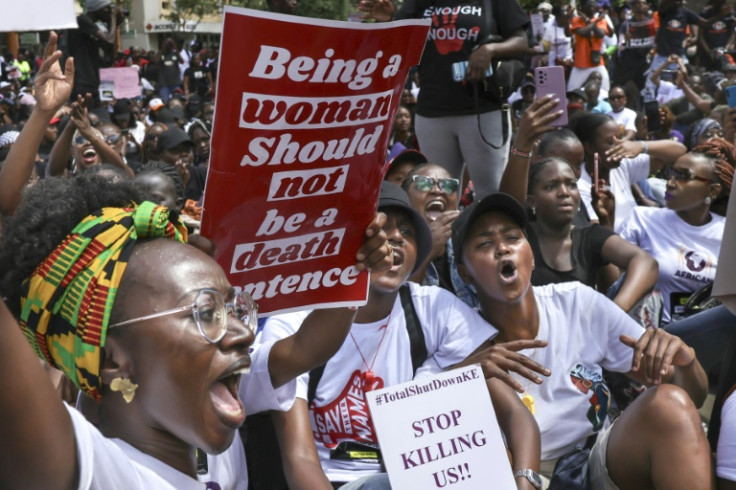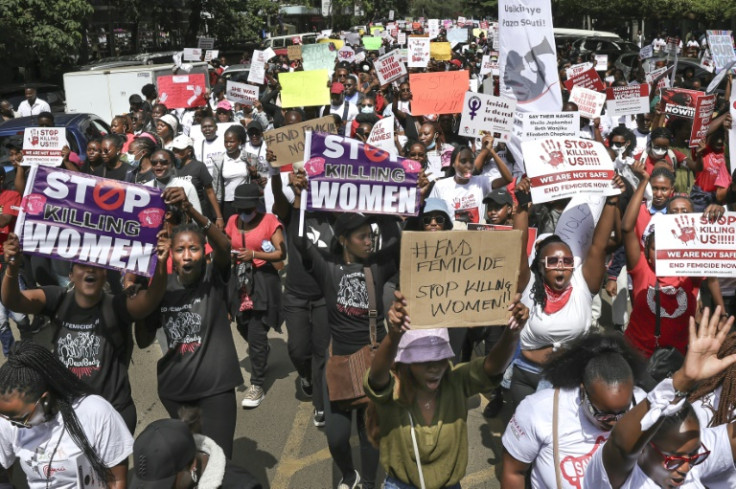
This week, Kenya saw its biggest protest that called for a woman's right to life and a crackdown on the soaring cases of femicide.
The demonstration, which was felt throughout the country, rallied against the government's failure to tackle a growing femicide epidemic throughout the East African nation.
Data shows that in the seven years between 2016 and 2023, there were at least 500 reported cases of femicide in Kenya.
A study that analysed the deaths of 564 women in Kenya between 2016 and 2023, published by Africa Data Hub, also exposed that 75 per cent of femicide victims are killed at the hands of their current or former romantic partners and 15 per cent of women are killed by strangers.
Considering the mass amount of unreported femicide cases, the accurate statistic is thought to be significantly higher.
The movement also demonstrated the anger and frustration towards the many acts of violence against women that go ignored and unreported.
According to the Gender Violence Recovery Centre, more than 33 per cent of women in Kenya are victims of some form of sexual assault before they turn 18.
One key demand amongst the protestors, predominantly women, was to seek justice for female victims by prosecuting perpetrators.
While no top government officials have spoken out against the killing of Kenyan women, Kenya's Public Service Cabinet Secretary Moses Kuria, responded to the call for justice in a statement.
"The government is very concerned about growing cases of crime and murders, mostly targeted at women in short-term rental spaces. Whereas most of these spaces are termed as Airbnb, they are not transacted through the Airbnb platform and thus there is no Know Your Customer (KYC) data collected, obviously a major security exposure," Kuria said.
While demonstrations occurred all over the nation, the country's capital city, Nairobi, saw the greatest number of people, as thousands of protestors took to the streets with placards and banners.
The symbols of protest read urgent messages, including: "Stop Killing Us!"

In January alone, according to the non-profit organisation Usikimye, a staggering 21 women were killed in the East African country.
While women are leading the #SayNoToFemicide, which has raised awareness of such issues on social media platforms like X, formerly Twitter, Kenyan men were also in attendance.
Bien-Aime Baraza, a Lead Vocalist in the Kenyan Afro-pop band Sauti Sol, also took to social media to share his frustration at the number of women who have been killed and abused across the country.
On Instagram, the Vocalist wrote: "Today we walked. May we never have to walk for this again. May we be more united by our joy than our pain. Sending love and light to all my sisters out there. I love you."
This news comes after a 20-year-old student was murdered in a rental apartment in Nairobi last month.
Rita Waeni was the victim of a gruesome murder that involved strangulation, decapitation and dismemberment, according to police reports.
Two men, who Kenyan police say are Nigerian, appeared in court after they were accused of the murder.
The male suspects have been named as William Ovie Opia and Johnbull Asbor, but neither have been charged.
Johansen Oduor, the Chief Government Pathologist who worked on the grim case, confirmed: "From all these [findings], I can comfortably conclude that what caused the death of that young lady was strangulation, after which she was decapitated and body dumped."
"The head is decomposed, and we have to be very sure by using scientific ways of knowing if indeed this belonged to that lady," he added.
Odour continued to tell reporters that, in all of his career, "this is the first time I have come across such an incident".
Along with the two Nigerian nationals, four Kenyan men and an individual with a Mozambican passport were also arrested in connection to the killing.







